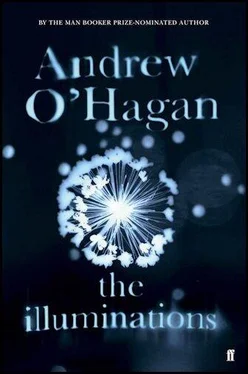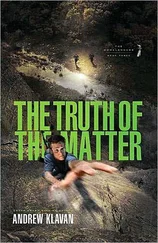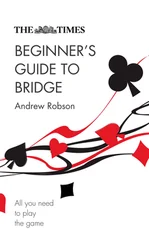‘I’m sure you don’t, Mrs Ward.’
‘They all drive. My God, it’s like a car showroom out there when they all come to visit. But I often look at my three and say, well, you didn’t do too badly. It was a struggle but they turned out nice.’
They worked in silence for a while, then Luke said not to take down too many things before they went, so’s not to alarm Anne just as they were setting out. ‘You might want this,’ Maureen said, handing him the photo of George Formby that had been pinned above the kettle. It had been there during all the time she had known Anne, looking down on them at night as they heated the soup and unfolded their lives.
THE VODKAS
Anne was squinting at the light and talking about holidays she had once taken with Harry. She would make comments and then go silent for whole stretches of the road. Luke found the moments of clarity really exciting. It was hard to admit that she was probably quite content generally and not just when she was talking sense and making him feel better. She seemed to admire the passing vehicles and she pointed without words at the mist over the houses on the road to Lesmahagow.
What is an adult? He’d always wondered. Was it a person who can speak when silent and who invents life, as opposed to just living it? At the wheel, Luke told himself she was the most adult person he had ever known. Some people would argue the opposite: that she had never grown up, that she had never faced things. But he was a happy student again, learning, over the miles, how to read a person by finding what character was available. She was brazen with words and actions no matter how baffled she seemed. No matter how far away she seemed, no matter how lost, she was with him, and he was determined to go with her as she slipped through the past into some brand-new element of the present.
‘There’s a reason I like you,’ she said. She added nothing for a moment and then said it again. ‘There’s a good reason.’
‘And what would that be?’ he asked.
‘You can read into things.’
‘How so?’
‘Stop fishing for compliments.’
‘I’m not!’
‘Well, then.’
‘Well, what?’
‘Then. Some people see a painting. They don’t know what it is.
Like that one of the place where the bombs fell.’
‘What painting is that?’
‘By the man who made his girlfriends have two faces.’
‘Picasso.’
‘That’s the one. He painted a town.’
‘Guernica.’
‘Is that what it’s called?’
‘Yes, Franco bombed it.’
‘I don’t know what I was saying.’
‘About how some people look at the painting of the bombed town.’
‘They don’t see the truth. They just see the paint.’
He took a deep breath. He knew as she reached for the words that she was uncovering the old ground of their sympathy. She’d used the example to him way back in the past — of how some people looked at
Guernica
and admired its form but couldn’t understand why it couldn’t just be an aerial photograph. But form told its own story, she used to say. And now she was struggling to say it again as the road vanished behind them.
‘I don’t know what it was about,’ she said. ‘Something about the man in Spain who never went on holiday because he hated photographs.’
‘I know what you mean.’
‘It’s nice to have that, a person in your family who knows what you’re talking about when you say about your work.’
‘That’s nicely put.’
‘It’s important,’ she said.
‘I agree.’
‘Deep down,’ she said.
‘Drumlanrig Castle’ flashed onto the windscreen with a load
of rain and grit. The wet cows in the fields got him thinking of those animals Scullion had liked to talk about, the extinct ones, the Asiatic cheetah, the goitered gazelle. When they passed another service station he thought of the melon stalls by the road in Helmand but the windscreen was now streaked with salt and he turned to her as she woke again.
‘Vodka,’ she said.
‘Vodka? Well, not in here, Gran. I would’ve brought a hip-flask if I knew you were going to go all karaoke.’
‘And tonic,’ she said. ‘Do we have that?’
After twenty minutes or so he turned off the motorway and stopped in Moffat. ‘Turn around when possible,’ the GPS said. Anne looked down at the voice and he turned it off.
‘Who’s that?’
‘Just the map,’ he said. ‘We’re on a detour.’ He drove into the town and parked across from a cashmere shop. He noticed how curious Anne’s eyes were and how young they seemed for a woman in her eighties. ‘Let me put your gloves on.’
‘Cold hands,’ she said.
The hotel wasn’t busy that afternoon and they got a nice table by the window. Luke came back with two vodkas and tonic and she smiled. ‘I don’t like that,’ she said, poking at the lemon with a finger. He took it out and put it in his own glass and clinked hers.
‘I’m glad you’ve got your gloves on,’ Luke said. ‘I don’t want you leaving any fingerprints. I don’t want people knowing I took my granny away and got her drunk.’
‘People sing,’ she said.
‘Have you been here before?’
‘This isn’t Blackpool, is it?’
‘No, Gran. You’ll know it when you see it.’
They crossed the border and Luke spoke of the letters Harry had sent to Anne in their early years. He wanted to help her picture things and put her story together, for him and for her, in readiness for Blackpool. He wanted to establish her good times. She didn’t ask him how he had come to read them, as if their contents must have been known to him all along. ‘So,’ he said. ‘You came to Glasgow from America about 1955. You gave up your apartment. You came back to look after the aunts in Atholl Gardens.’
‘Is that my house?’
‘Theirs. Up the West End.’
‘Gardens.’
‘That’s right.’
‘A lot of bedrooms.’
‘You were looking after them. And after a few years you joined a photography club. Do you remember?’
‘My Auntie Anna died.’
‘You joined the Glasgow Camera Club.’
‘Was it in a long street?’
‘Sauchiehall Street.’
‘I used to go there.’
‘And in 1958 the club went to Blackpool. It was a trip. You all went down on a bus.’
‘That’s where Harry lived.’
‘No. Harry lived in Manchester. You saw him give a talk at the Masonic Hall.’
‘In Blackpool?’
‘Adelaide Street. You went with your friends to hear him talk about photography.’
‘Harry spoke.’
‘Yes. He sent you a cutting about it that was in the paper. The talk was called “The Ethics of Documentary Photography”. I think that’s what it was. He wrote to you about it once you were back in Glasgow.’
‘Is that right?’
‘Yes.’
‘My voice is different. I have an accent.’
‘He spoke about Bert Hardy and the man who took the pictures of the children on the streets in London.’
‘I know Bert Hardy.’
Bert phoned and said there’s an editor from America who wants the youth of today.
Luke mentioned more dates and details he’d gleaned from the letters. He went carefully. Some made her nod while others silenced her. Harry’s letters spoke of these men, the Young Meteors he called them, who had a new approach to capturing life in Britain. ‘And you kept going back to Blackpool. Did you have other friends there?’
‘Harry lived near there, in Manchester.’
‘Right.’
‘We’d meet at Woolworth’s. Under the clock tower.’
It was obvious from the letters that Anne had started taking pictures again when she met Harry. She was looking after the aunts, but she went to the Camera Club to escape, then Blackpool
Читать дальше











